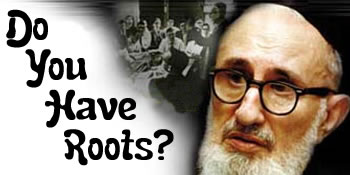
I was seven or eight years old in a small town in White Russia, and like all Jewish boys, I attended the little Cheder school.
I still remember that dreary winter day in January; it was cloudy and overcast. The Torah portion of the week was Vayigash (Genesis 44:18-47:27), and Chanukah had just ended, taking away with it the joyous holiday spirit from our small town.
A long, dark winter lay ahead for us cheder boys. We had to rise when it was still dark, and return home holding a lantern, because nightfall was so early.
That day, we Cheder boys were in a depressed mood, lazy and listless. We chanted mechanically the first verses of Vayigash in a dull monotone, droning the words in Hebrew and translating it into Yiddish.
One boy finished reciting Joseph's question: Ha-yesh lachem av? Do you have a father? and the reply: Yesh lanu av zaken: Yes, We have an old father..."
Then something unusual happened. Our teacher, a chabadnik, suddenly jumped to his feet and with a gleam in his eyes motioned to the reader to stop. He turned to me and addressed me with the Russian word podrabin, meaning "assistant to the rabbi."
The teacher asked me: "What kind of question did Joseph ask his brothers, Ha-yesh lachem av? Do you have a father? Of course they had a father, everybody has a father! The only person who had no father was Adam, created by G-d. But everyone else born into this world has a father. What kind of a question was that?"
I tried to offer the answer, "Joseph simply wanted to find out whether the father was still alive. "Do you have a father?" actually means, "is he alive, or is he dead?"
"If so," our teacher thundered back at me, "Joseph should have phrased the question differently, "Is your father still alive?"
It was useless to argue with our teacher. He was now no longer addressing only us little boys. He began to speak rhetorically as if some mysterious guest had just entered that cold room.
"Joseph," our teacher pronounced as if from a pulpit, "wanted to know whether his brothers were still attached to their roots and origins.
"Are you," Joseph was asking, "rooted in your father? Do you look at him the way the branches or blossoms look on their roots? Do you see your father as the foundation of your existence? Do you see him as your provider and sustainer? Or are you just like rootless shepherds wandering from place to place, from pasture to pasture, who forget their origin?"
Our teacher suddenly stopped addressing the invisible visitor and turned his focus directly to us.
Raising his voice, he asked us: "Are you truly humble? Do you look down condescendingly at your old father as representing an archaic tradition? Do you think that your old father is also capable of telling you something new and exciting? Something challenging? Something you didn't know before? Or are you so arrogant and vain, that you deny dependence on your father, upon your source?"
"Ha-yesh lachem av?! Do you have a father?!" exclaimed our teacher, pointing at my study-mate Isaac, who was considered the town's prodigy.
The teacher turned to him and said, "Who do you think knows more? Do you know more because you are so well versed in Talmud, or does your father, Jacob the blacksmith, know more even though he can barely read Hebrew?
Are you proud of your father? When we recognize the supremacy of our father, then, ipso facto, we accept the supremacy of our Universal Father in Heaven."
I will never forget our teacher's novel interpretation of the Joseph story.
Excerpted from "The Rav, the world of Rabbi Joseph B. Soloveichik" by Aaron Rakaffet.

